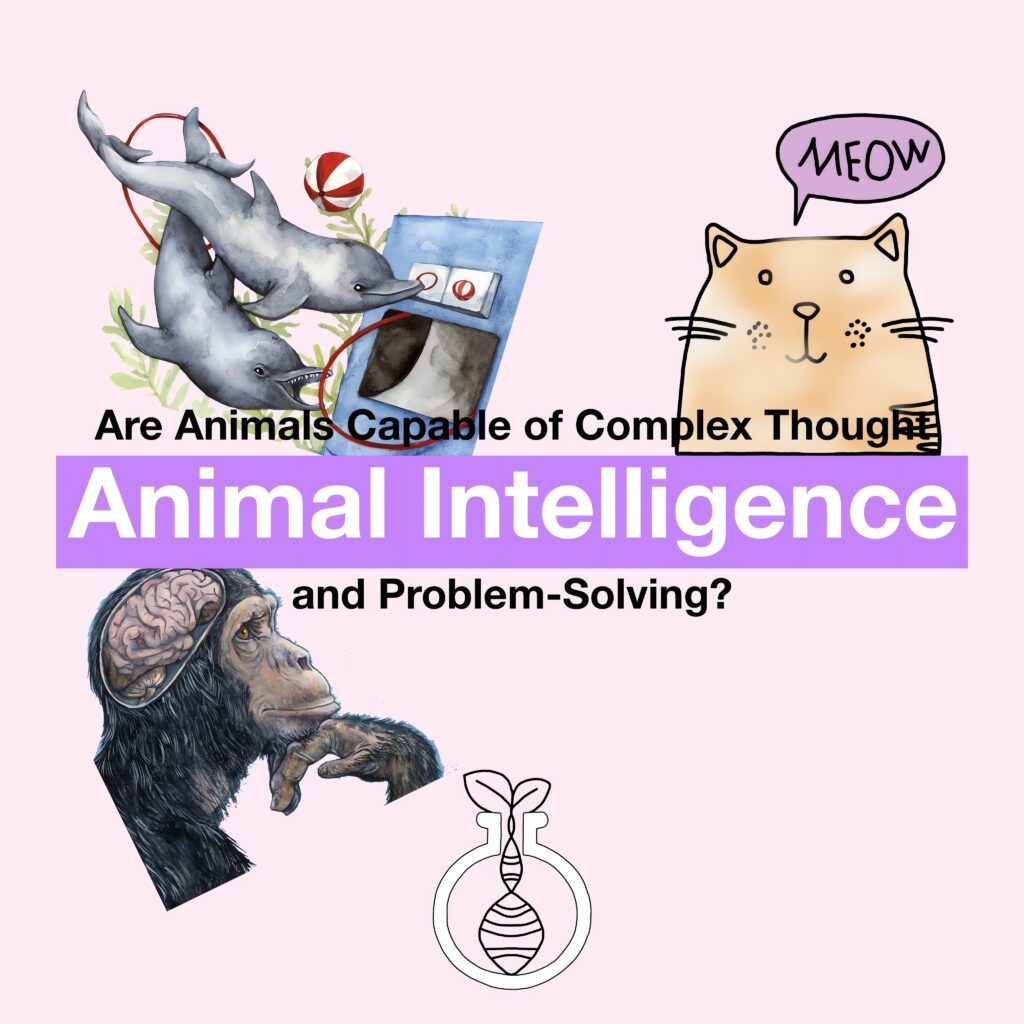When we think of intelligence, we often picture human achievements—building skyscrapers, writing novels, or decoding the mysteries of the universe. But look closer, and you’ll find that nature has been showcasing its own brand of intelligence for millennia, in creatures great and small. The big question is: Are animals capable of complex thought and problem-solving? Let’s take a deep dive into the fascinating world of animal intelligence, where problem-solving isn’t exclusive to humans but shared by some of our most unexpected companions.
More Than Instinct: Can Animals Think?
At first glance, animal behavior might seem driven by pure instinct—a set of automatic responses hardwired into their DNA. But what if there’s more beneath the surface? Animals, it turns out, are much more than biological machines running on autopilot. Their intelligence is woven into their daily survival, showing up in surprising ways.
Imagine your brain as a toolkit, packed with everything you need to navigate the world—tools for learning, remembering, and solving problems. Now, imagine that animals have their own toolkits, too, and that each species has developed its unique set of tools to survive and thrive in its environment. From chimps using sticks to catch termites to dolphins using sea sponges to protect their snouts, the question is not whether animals can think, but how they do it.

The Cleverest Creatures: Examples of Animal Intelligence
Let’s start with some of the all-stars of the animal kingdom—creatures whose intellect has not only surprised scientists but redefined how we view animal intelligence.
Chimpanzees: The Problem-Solving Cousins
Chimps, our closest relatives, share about 98% of our DNA. But they don’t just look like us—they think like us, too. In the wild, chimps have been observed crafting tools to solve problems that would stump many humans. Need a quick snack? A chimp will fashion a twig into a fishing tool, carefully inserting it into a termite mound to pull out tasty treats. It’s not just using tools—it’s creating them.
Even more mind-boggling is their social intelligence. Chimps are master tacticians when it comes to navigating their complex social hierarchies. They’ve been observed forming alliances, deceiving rivals, and even reconciling after fights. It’s like watching a political drama unfold in the forest.
Dolphins: The Ocean’s Intellectuals
Now, let’s dive beneath the waves and meet the bottlenose dolphin, known for its playful nature—and razor-sharp intellect. Dolphins live in complex social groups and communicate with a language of clicks, whistles, and body movements, a sort of dolphin Morse code. They even call each other by name—specific whistles that identify individual dolphins, like humans calling out, “Hey, Sarah!”
But it doesn’t stop there. Dolphins are problem-solving masterminds. When hunting fish, they’ve been known to create “bubble nets”—circles of bubbles that trap fish inside for easy capture. It’s an ingenious technique that requires planning, communication, and teamwork, proving that their intelligence goes far beyond simple survival instincts.
Crows: The Feathered Engineers
If you thought tool-making was just for primates, meet the New Caledonian crow. These birds are not only capable of crafting tools, but they do so with impressive creativity. Researchers have watched crows bend wire into hooks to retrieve food from hard-to-reach places, demonstrating not just tool use, but problem-solving on the fly.
Crows also have remarkable memories. They can remember human faces, recognizing and avoiding people who’ve previously threatened them, while rewarding those who’ve been kind. It’s as if they carry a mental blacklist—and VIP list—of the people in their environment.

Thinking Like Humans?
Okay, so animals can solve problems. But does that mean they think like us? Well, the answer is both yes and no. Animals do exhibit problem-solving skills, but they approach challenges differently. Their intelligence is tailored to their environment—what we might call ecological intelligence. It’s not the same as sitting down to solve a crossword puzzle, but it’s every bit as impressive.
For example, octopuses, the masters of escape, are renowned for their ability to solve puzzles. These clever creatures have been known to unscrew jars to access food inside, open aquarium lids, and even navigate mazes. But unlike humans, octopuses don’t have the luxury of a social group to rely on. Their intelligence is born from their need to survive in isolation, making them masters of solo problem-solving.

Animal Emotions and Empathy: More Than Just Survival
Intelligence isn’t just about solving puzzles—it’s also about understanding emotions and social dynamics. Animals often demonstrate behaviors that seem strikingly empathic, suggesting that their thought processes are more complex than we once believed.
Take elephants, for instance. When a member of their herd dies, elephants have been observed performing what looks eerily like mourning rituals. They’ll gently touch the bones of their lost loved ones and stand vigil over the body, refusing to leave it behind. This deep emotional bond hints at a level of intelligence that goes beyond mere survival.
Even dogs, our faithful companions, demonstrate empathy. Ever notice how your dog comes over to nuzzle you when you’re feeling down? Studies show that dogs can read human emotions, responding to our cues with comforting behaviors. This emotional intelligence makes them exceptional partners, not just in daily life but in therapy and rescue missions as well.

Are We Ready to Acknowledge Animal Intelligence?
So, what does this mean for how we view the animal kingdom? It turns out that animals, from the birds in the sky to the fish in the sea, possess cognitive abilities that rival our own in unexpected ways. They craft tools, solve problems, and form complex social bonds. Some species even demonstrate behaviors that seem uncannily close to human empathy.
This isn’t just a fun discovery—it’s a revelation. If animals are capable of such complex thought, problem-solving, and emotional depth, what does that say about the way we treat them? Should our newfound understanding of animal intelligence shape how we interact with the natural world? These are the ethical questions we’ll need to grapple with as science continues to uncover more about the minds of animals.
Conclusion: Beyond Instinct
As we unravel the mysteries of animal intelligence, it becomes clear that many species are capable of more than just instinctual survival. From chimpanzees crafting tools to crows outsmarting traps, animals possess a rich and varied cognitive toolkit. Their intelligence may not mirror ours exactly, but in their own right, they’ve mastered the art of survival—and perhaps even something deeper.
So, the next time you watch a squirrel outwit a bird feeder or a dolphin playfully leap through the waves, remember: we’re not the only clever creatures on this planet. Animal intelligence is real, and it’s remarkable. The question now is not if animals are intelligent, but just how deep their intelligence goes.


My name is Ali Emre Cabadak, a dedicated biology enthusiast currently pursuing my studies at Marmara University, where I am majoring in Bioengineering. As a passionate advocate for scientific discovery and innovation, I am the founder of Biologyto. My goal is to bring the wonders of biology closer to everyone and inspire a new generation of thinkers and innovators. Through Biologyto, I aim to write scientific articles that delve into the fascinating world of biology, sharing insights and discoveries that inspire curiosity and innovation.





